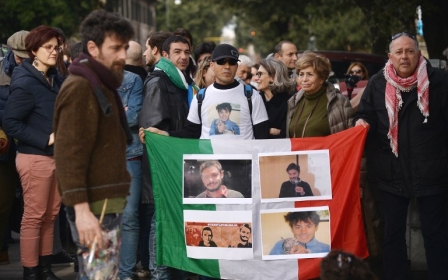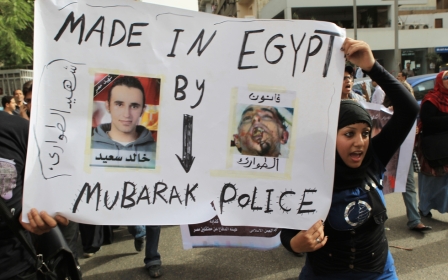Egypt says Italy’s request for phone records in Regeni case was denied

Egypt's assistant state prosecutor said on Saturday Italy had demanded thousands of phone records to investigate the murder of student Giulio Regeni in Cairo, but the request was denied because it was unconstitutional.
Mostafa Suleiman told a news conference that Italian investigators had made the demand during an inconclusive meeting in Rome last week that prompted Italy on Friday to recall its ambassador from Cairo.
Regeni, a 28-year-old Cambridge University PhD student, was in Egypt researching labour unions when he disappeared on 25 January. His badly mutilated body was found more than a week later by the side of a road.
Human rights groups say the wounds bear the hallmarks of Egypt's security agencies and point to the scores of Egyptians who have disappeared over the past year, Reuters reported. Egyptian officials have repeatedly denied involvement in his death but have struggled to offer an explanation to satisfy Italy.
Suleiman said Italian investigators had asked for records of "all subscribers in areas in where [Regeni] lived, where he disappeared and where his body was found," Suleiman said, adding that the number could even reach a million.
"This demand conflicts with and violates the Egyptian constitution, and would constitute a crime," he said
Suleiman added that the Italian investigators "conditioned further judicial cooperation on this demand," but the Egyptian delegation in Rome flatly refused.
Rome announced that it was recalling its ambassador over lack of progress in the probe into Regeni's brutal murder.
Suleiman said that the Italian investigators had also demanded CCTV footage that had been automatically deleted by then, but Egypt made inquiries and found that a program could be purchased that might have retrieved it.
He said they asked Italy for help but the matter was "still under study".
'Get the truth'
Egyptian Foreign Minister Sameh Shoukri, meanwhile, told his Italian counterpart that recalling the ambassador "raised question marks" in light of what he said was Egypt's cooperation in the probe.
A foreign ministry statement said Shoukri had called his Italian counterpart, Paolo Gentiloni, on Saturday and described to him the extent of Egypt's cooperation.
"The foreign minister told his Italian counterpart that this approach raised question marks about the goals of these decisions," the statement said of the ambassador's recall.
Italian officials suspect that the student was killed by elements in the Egyptian security services. Their Egyptian counterparts have maintained that there is no basis for such claims.
Egypt's presentation of a theory that a criminal gang murdered him was greeted with outraged scepticism in Italy and has helped fuel public anger over the case, putting intense pressure on Prime Minister Matteo Renzi to be seen to be getting tough with Cairo.
"Italy has undertaken a commitment with the Regeni family ... that we would stop only once we get the truth," Renzi said.
The withdrawal of Rome's ambassador is unlikely to satisfy those who are demanding that Renzi send a strong signal of Italy's anger over the case to Egypt's president, Abdel Fattah al-Sisi.
Renzi has a close relationship with Sisi that has helped to generate valuable business contracts for Italian companies, particularly in the energy sector.
Italy is also counting on Egyptian cooperation if and when it leads an international peacekeeping force into Libya to try to stabilise its former north African colony.
Media coverage of the Regeni case has served as a focus for other disappearances and rights abuses in Egypt.
In terms of action, Italy's options are limited.
Moves under consideration include a warning to its citizens against travel to Egypt, but the Regeni case has already caused a slump in visitor numbers from Italy.
Rome is also considering asking for support from its EU partners to try to put pressure on the Egyptian government over the case.
New MEE newsletter: Jerusalem Dispatch
Sign up to get the latest insights and analysis on Israel-Palestine, alongside Turkey Unpacked and other MEE newsletters
Middle East Eye delivers independent and unrivalled coverage and analysis of the Middle East, North Africa and beyond. To learn more about republishing this content and the associated fees, please fill out this form. More about MEE can be found here.




